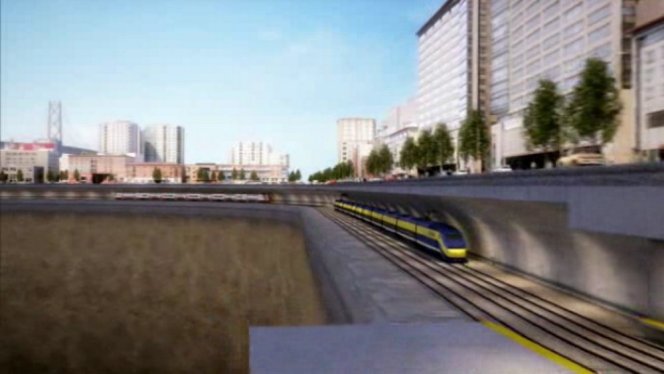The San Francisco County Transportation Authority (CTA) Board authorized $5.5 million in Prop K funds for the downtown extension rail tunnel (DTX) project that will one day connect Caltrain's mainline to the Transbay Terminal. The money was allocated by unanimous consent of the board at its regular meeting at City Hall this morning.
Although this is just for preliminary engineering and a "tunneling options" study, this is a big step forward. Transit advocates have long bemoaned the delays and perceived lack of focus on this project.
Streetsblog readers will recall that the DTX, which would finally bring commuter and, eventually, high-speed rail services directly into downtown San Francisco, has seen repeated delays. Critics have bemoaned the project's lack of a political champion, as well as the seemingly endless discussions about the alignment for the $2.6 billion project. Then, when a $647 million federal grant for Caltrain electrification was cut off by the Trump Administration earlier this year, questions arose about whether or not trains would even be able to use the DTX tunnel. Further delays by the Board led to rumors in the press that the DTX might be shelved altogether.
But today at least was a good day for the DTX.
There were a handful of speakers from the public, all strongly supportive. "The DTX remains our highest capital priority for major rail projects after the Central Subway," said Peter Straus, one of the founders of the San Francisco Transit Riders. "We have to maintain our commitment to it despite any threats from DC."
"What’s before you is a big deal...for the last five years we have futzed around about how to get the train downtown; what you have before you today is finally a way to do that," said Jim Haas, an attorney who sits on the Transbay Community Advisory Committee.
"This board has dallied for four months," echoed Jim Patrick, a local businessman and supporter of the project. "We don’t need any more delays."
Supervisor Aaron Peskin, who chairs the commission, bristled at those characterizations, and defended the delays which he said were justified given the questions about Caltrain electrification, delays in the construction of the Transbay Terminal itself, and the DTX's price tag. "Phase 1 has been an absolute nightmare, with cost overruns, delays, mismanagement...when we go into phase 2 [DTX] we want to do it with our eyes wide open." The Board is also appropriating $200,000 for city oversight of the tunneling and engineering.
After the approval, supporters of the DTX met outside the board room. There were some questions about whether or not there would be yet another bureaucratic step to get the engineering started, since Peskin approved it without calling a vote. But a staffer for Peskin explained to Streetsblog that the chair can approve an item without a roll-call vote if it's clear that support is unanimous, provided none of the commissioners speaks up to object. Once it was confirmed that the DTX was, indeed, ready to move forward with preliminary engineering, the supporters took a moment to celebrate. "We are building smart stuff," said Armie Morgan, business representative with the Operating Engineers Local #3, adding that the project will help with their apprentice program to get the next generation of construction engineers trained and working in San Francisco.
Scott Boule, an outreach manager with the Transbay Joint Powers Authority, added that the Transbay station, meanwhile, is nearing completion--buses will start running into the terminal by the end of the year. He mentioned how a short time ago the Transbay terminal was just a big hole in the ground.
"Now it's a bus station on top of a hole in the ground," quipped Straus, who, while happy about the morning's victory, bemoaned the timeline--the first trains aren't expected to arrive at the Transbay station until 2026.
Meanwhile, several other items important to the livable streets movement were also approved, including $193,475 in Prop. K funds for Bike to Work Day and the Central Richmond Neighborway Project. Additionally, $602,254 was approved for the Geary Bus Rapid Transit Project. And the final report was approved for the Western Addition Community-Based Transportation Plan. The Board also heard a report about the state transportation bill.






